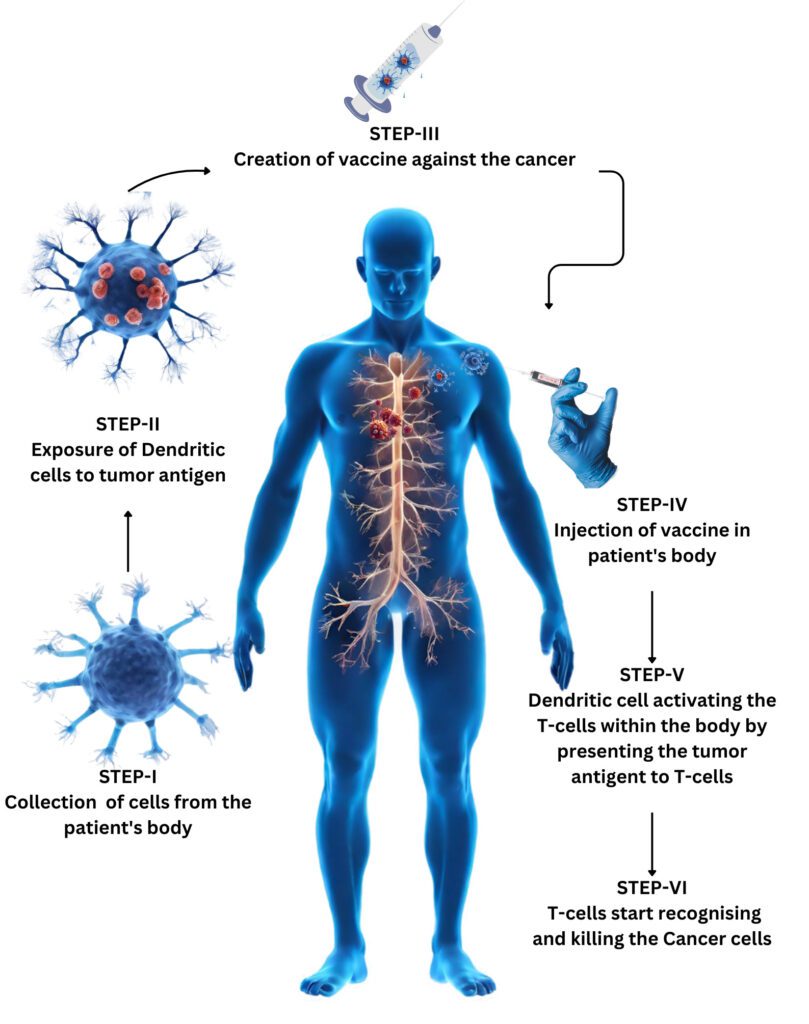Subtotal $0.00

Swiss Health Clinic AG
Stauffacherstr. 36
CH-8200 Schaffhausen
Shopping cart
- Phone:+41 (52) 56030-00
- Email:info@swiss-health-clinic.ch

Swiss Health Clinic AG
Stauffacherstr. 36
CH-8200 Schaffhausen

In the ever-evolving landscape of medical treatments, innovative therapies continue to emerge, offering hope and potential breakthroughs for various diseases. One such promising approach is Dendritic Cell Therapy (DCT), a form of immunotherapy that harnesses the body’s own immune system to combat diseases.
Dendritic Cell Therapy (DCT) also known as vaccine therapy is a cutting-edge immunotherapy that utilizes dendritic cells, the sentinels of the immune system, to trigger an immune response against specific targets such as cancer cells or pathogens. Dendritic cells play a pivotal role in recognizing foreign invaders and activating other immune cells to recognise and kill these cancer cells or pathogens.
The process begins by isolating dendritic cells from a patient’s blood or bone marrow. These dendritic cells are then exposed to antigens derived from the target disease, which could include cancer-specific antigens or microbial components. By presenting these antigens, dendritic cells become primed and activated.
Once activated, dendritic cells migrate to lymphoid organs, where they interact with T cells, which are crucial players in adaptive immunity. Dendritic cells effectively activate the T cells, prompting them to mount a targeted immune response against cells expressing that antigen, such as cancer cells or infected cells, ultimately leading to the death of those cells or pathogens.
Dendritic Cell Therapy (DCT) is typically conducted as an outpatient procedure within specialized medical facilities. It involves a series of steps beginning with a comprehensive patient evaluation to assess their suitability for the therapy, encompassing physical examinations, laboratory tests, and imaging studies.
Following this, a small blood sample, approximately 200 milliliters, is collected from the patient, containing the monocytes necessary for dendritic cell production. In the laboratory, these monocytes are isolated from the blood sample and transformed into dendritic cells using specialized techniques. Over several days, these dendritic cells are primed to recognize tumor antigens, crucial for their effectiveness. Subsequently, the activated dendritic cells are reintroduced into the patient’s body through either intradermal or intravenous injection.
Dendritic cells specifically target cells expressing the antigen of interest, minimizing collateral damage to healthy tissues.
DCT can induce memory T cell responses, providing prolonged protection against disease recurrence.
Since dendritic cells are derived from the patient's own body, there is reduced risk of adverse reactions or rejection.
DCT can be combined with other therapies such as chemotherapy, radiation, or checkpoint inhibitors to enhance treatment efficacy.
DCT shows promise in various medical conditions, including.
DCT is being investigated as a potential treatment for various metastatic cancers, including melanoma, prostate cancer, glioblastoma etc.
DCT holds potential for combating viral infections such as HIV, hepatitis B and C, and bacterial infections.
By modulating immune responses, DCT may offer avenues for treating autoimmune conditions like rheumatoid arthritis and multiple sclerosis.